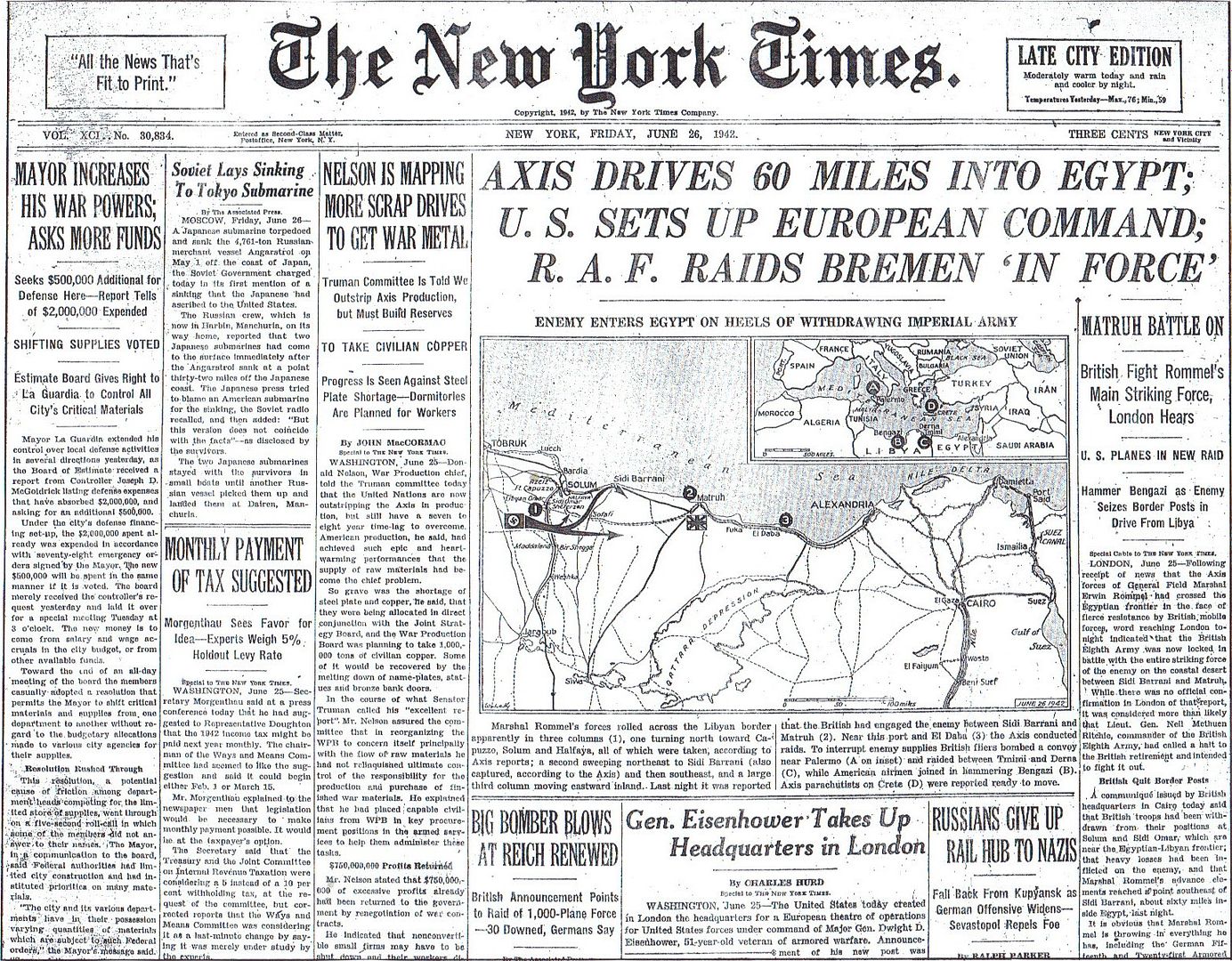
Posted on 06/26/2012 4:04:24 AM PDT by Homer_J_Simpson

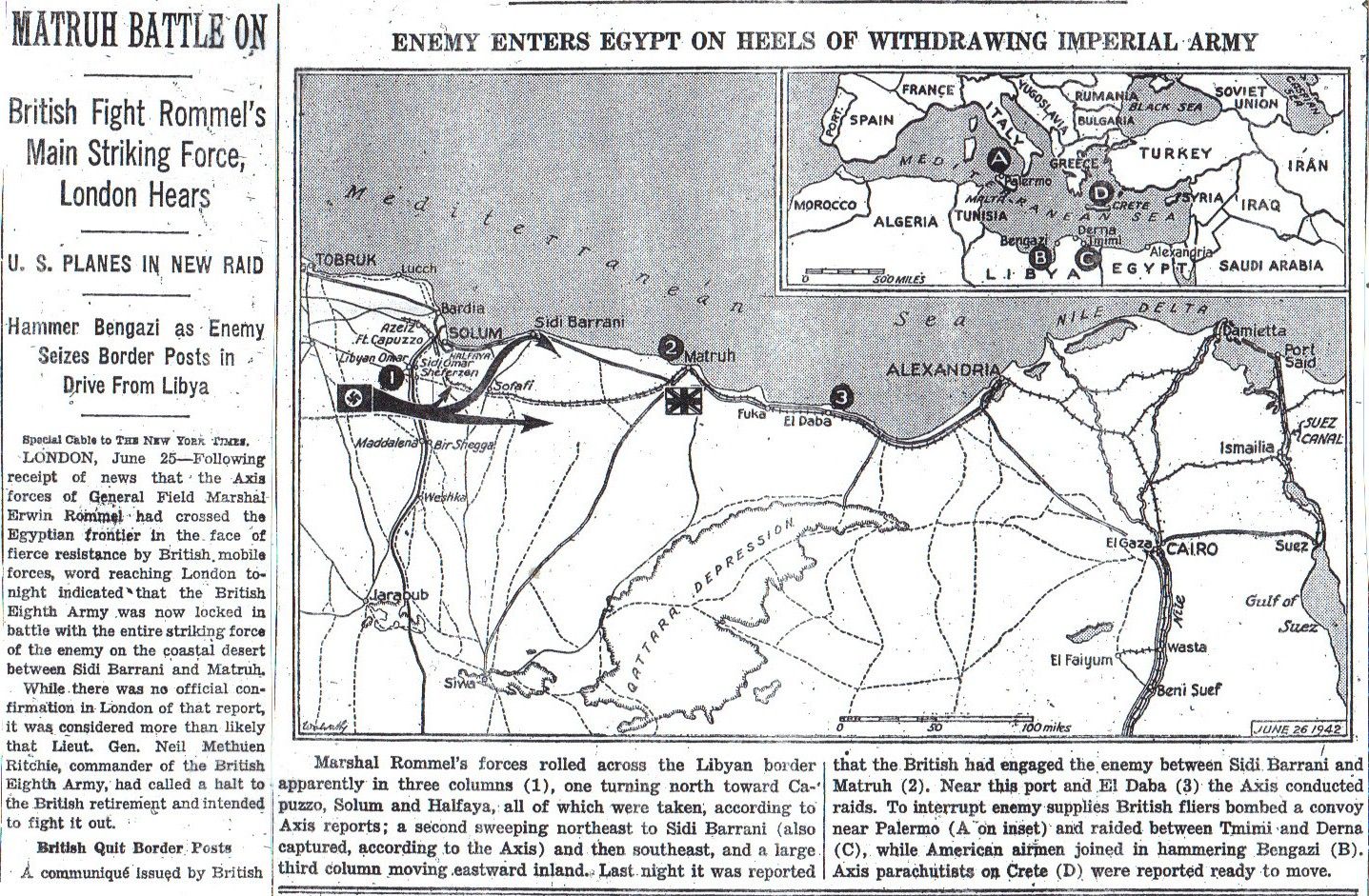
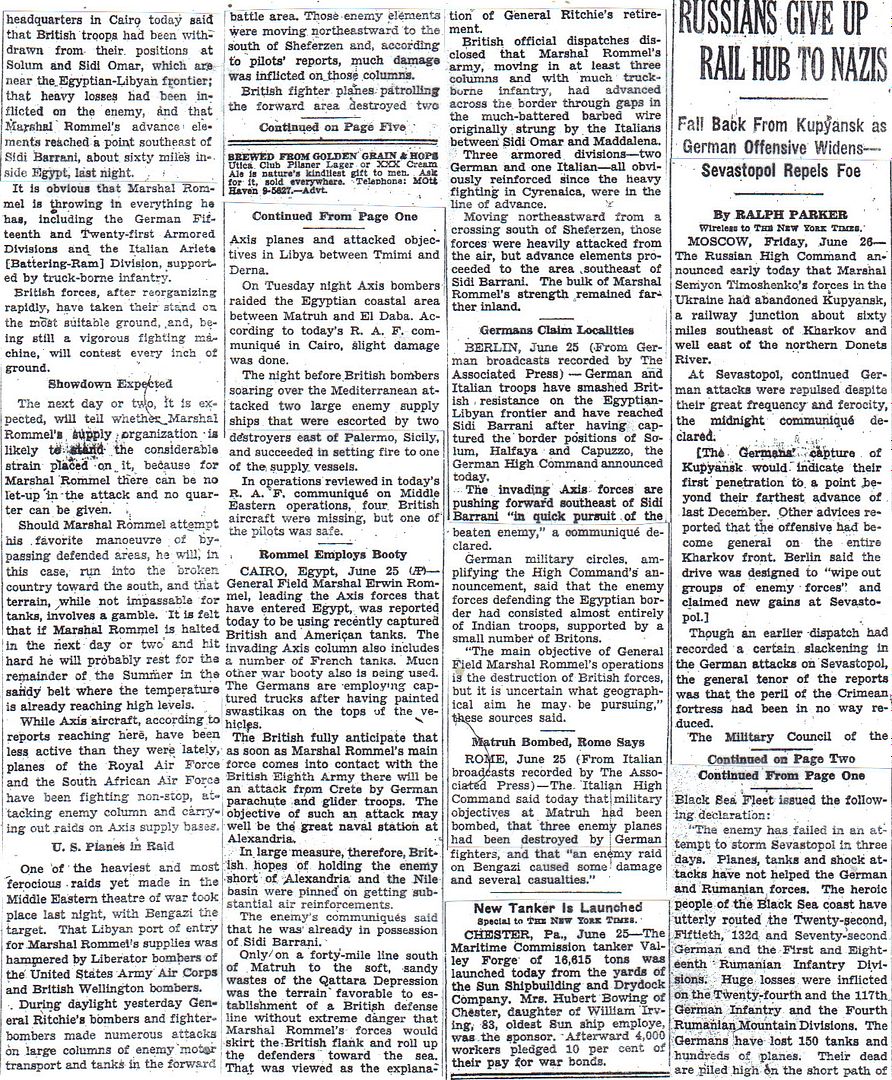
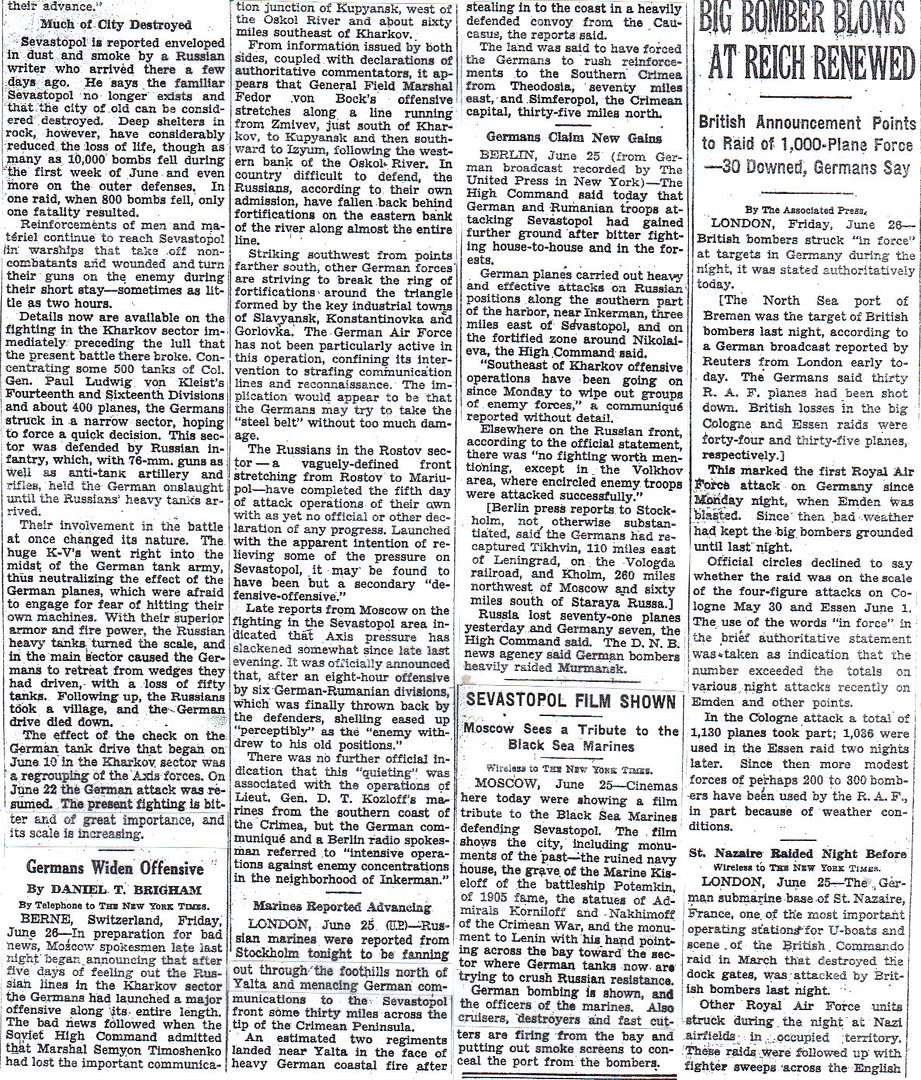
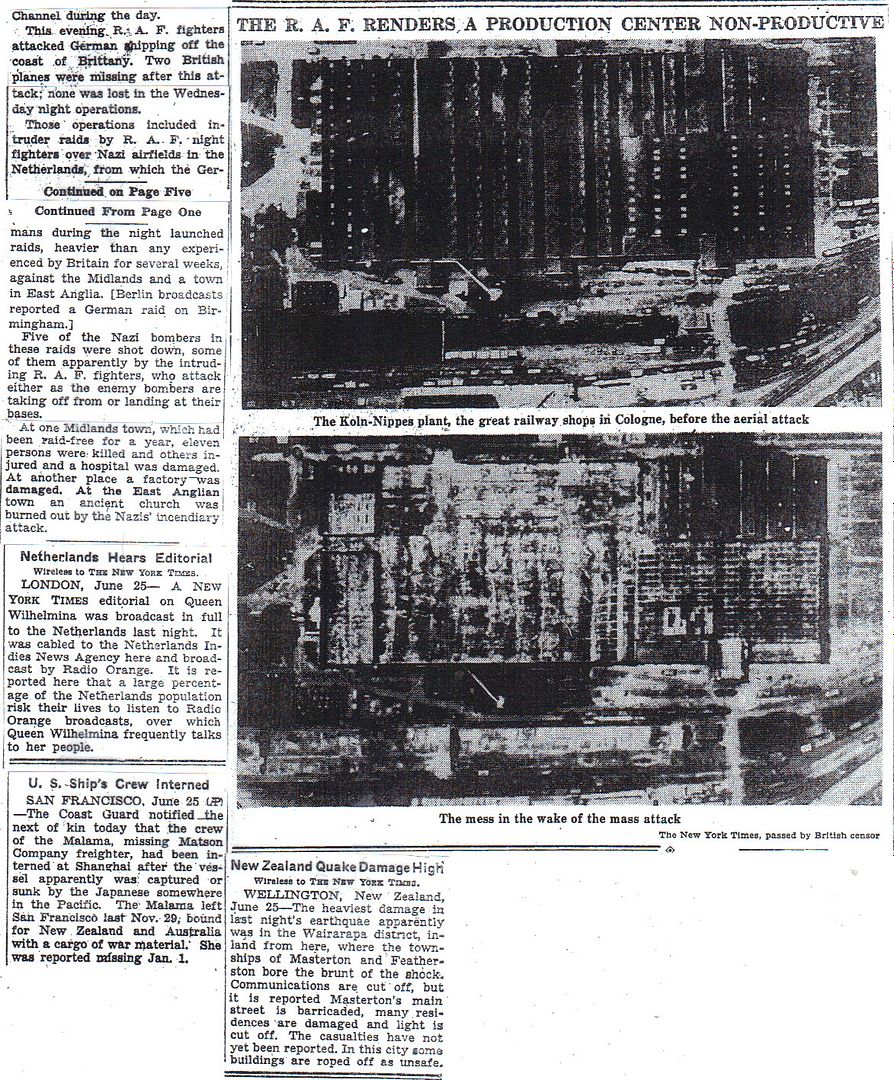
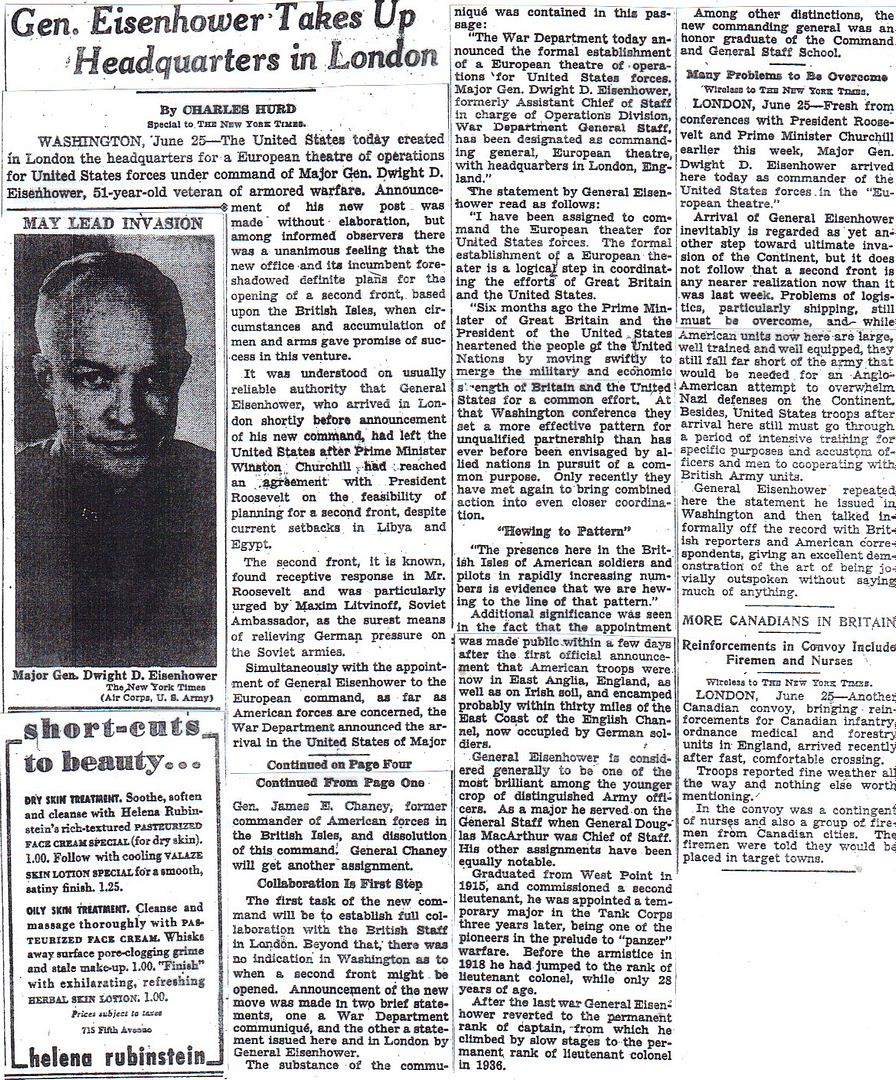
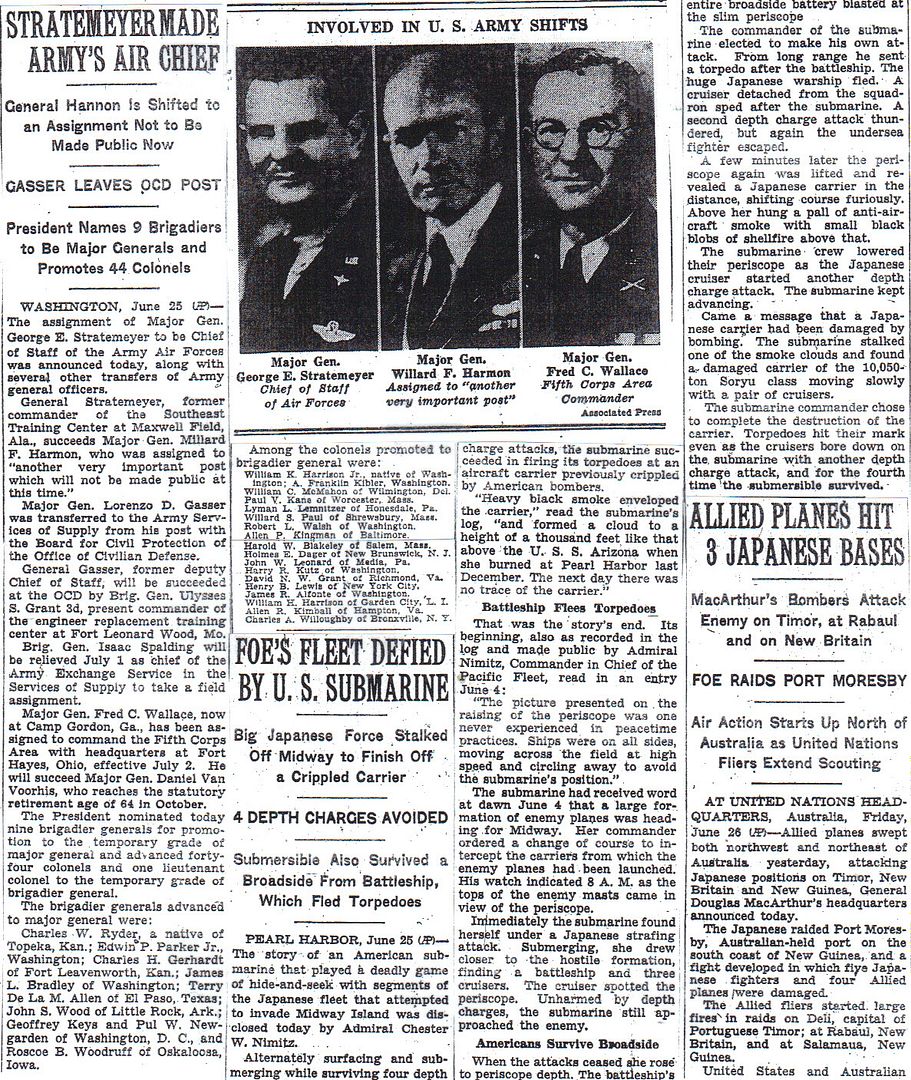
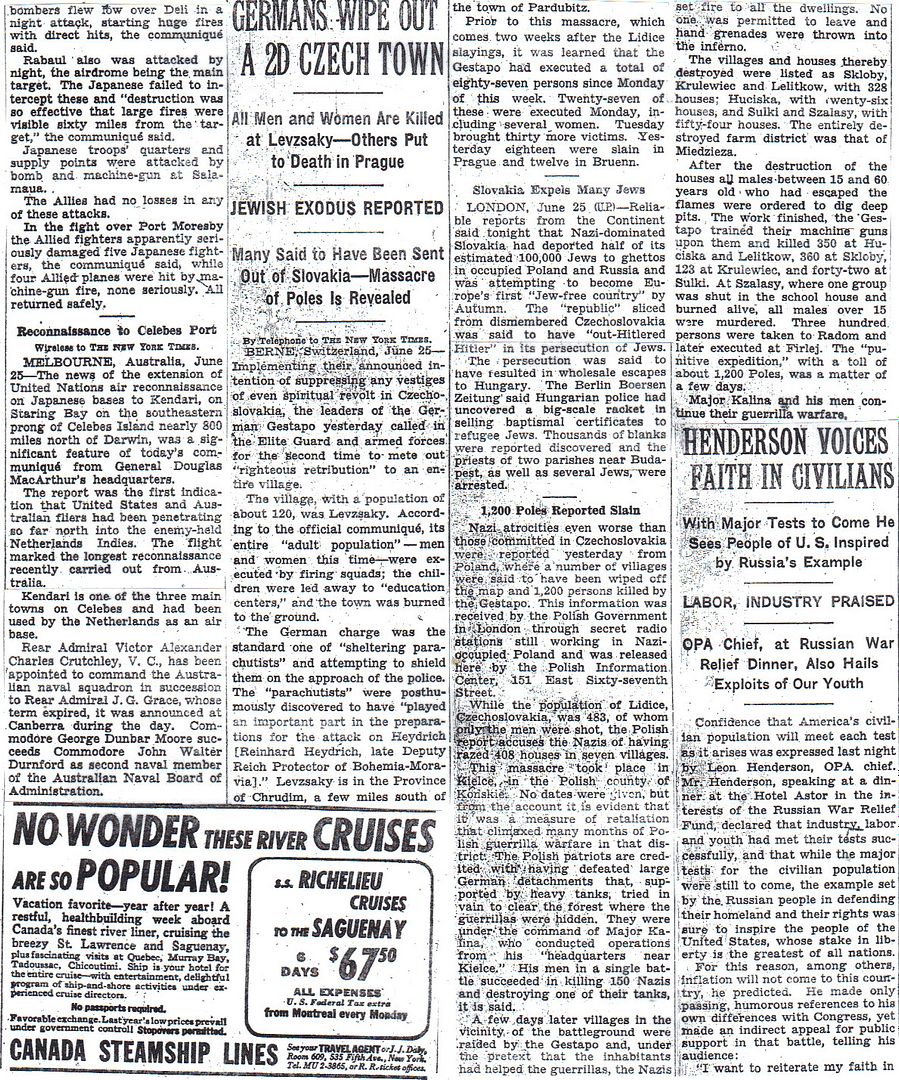
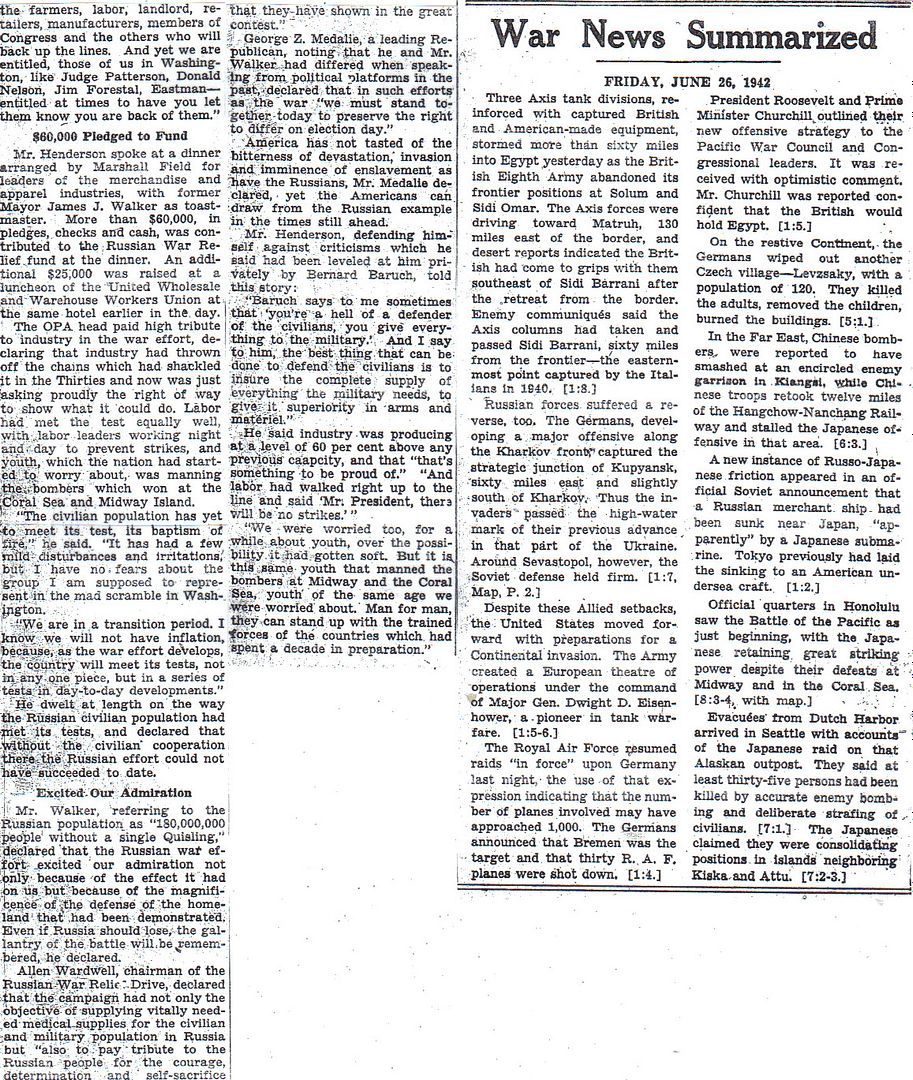
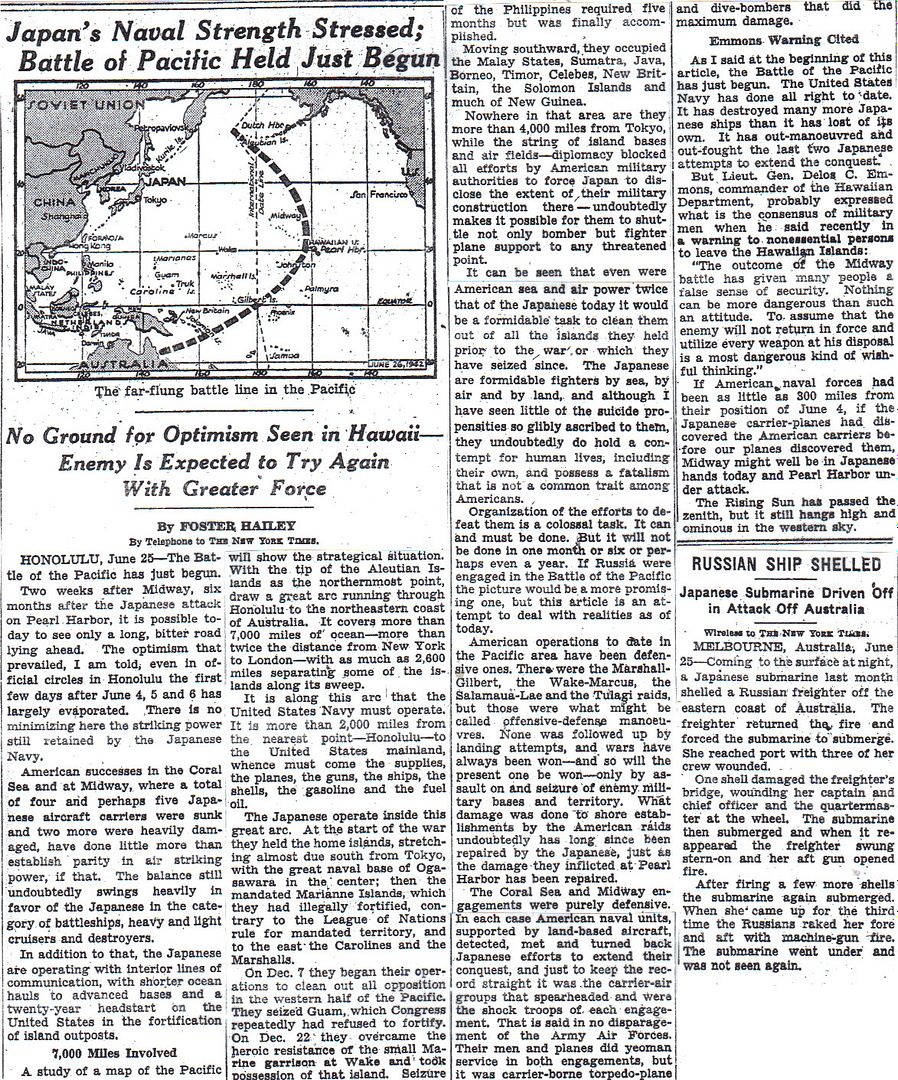
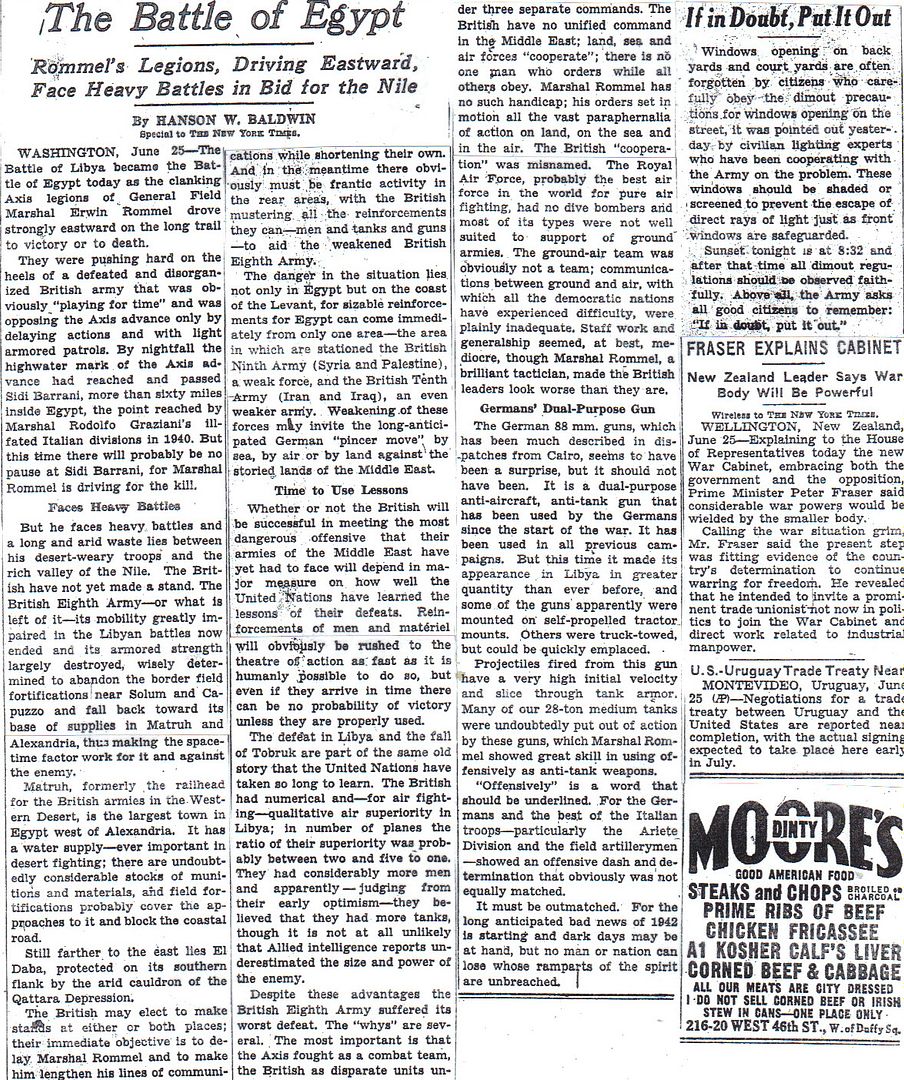
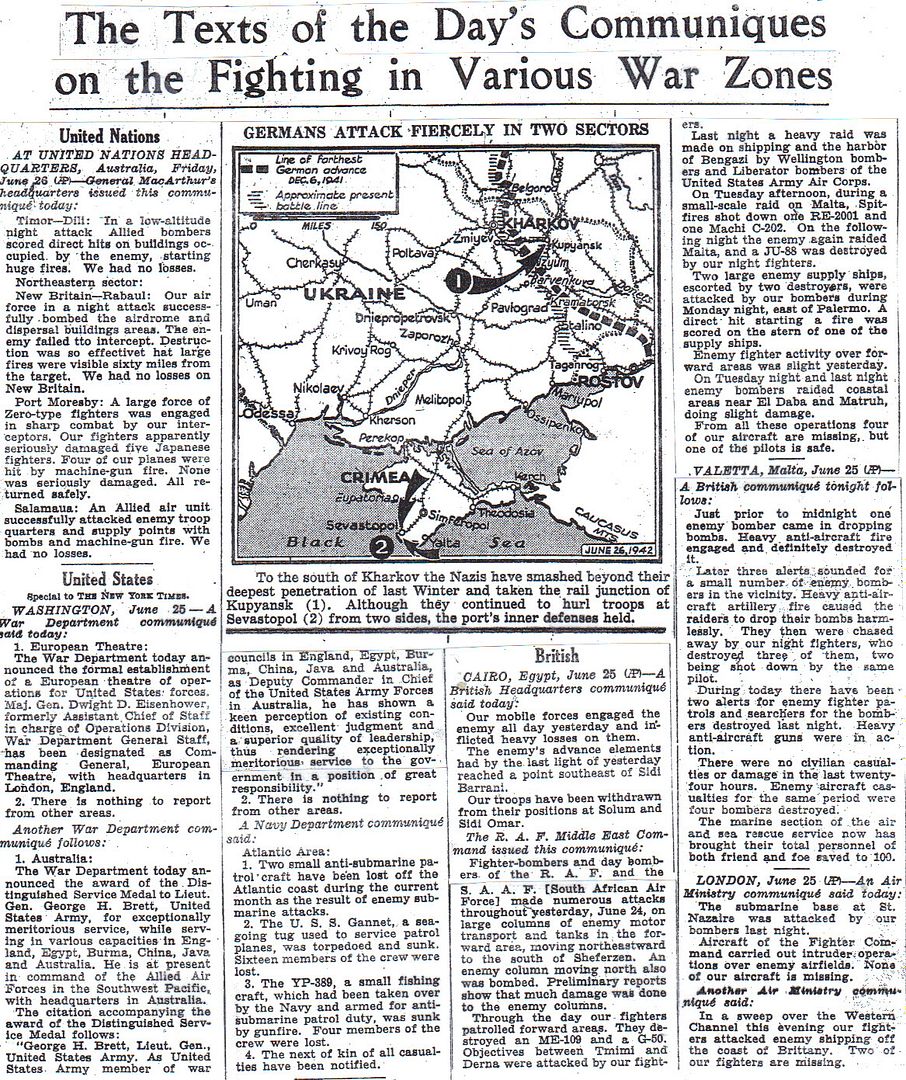
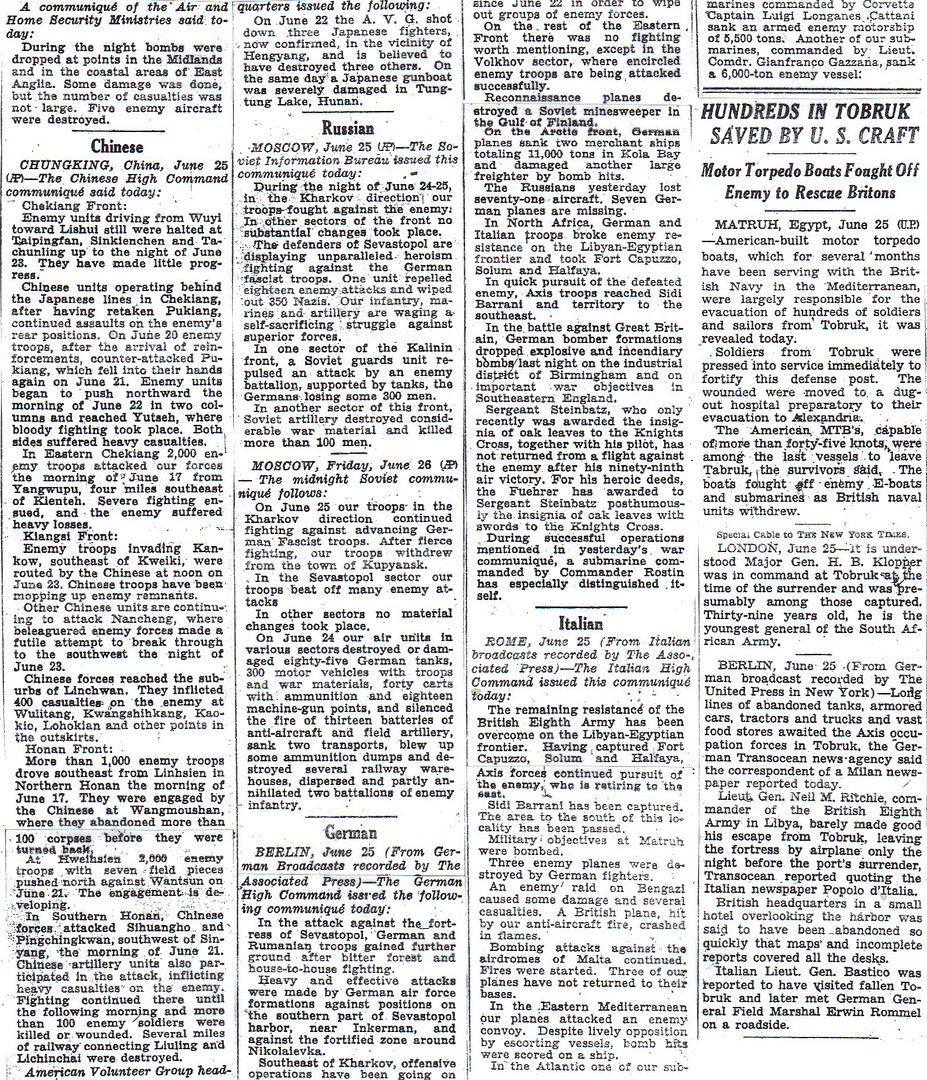
http://www.onwar.com/chrono/1942/jun42/f26jun42.htm
Final 1,000 plane raid targets Bremen
Friday, June 26, 1942 www.onwar.com
British Lancaster bombers flying in formation [photo at link]
Over Germany... The final RAF 1,000 plane raid bombs Bremen. The training squadrons used to raise the number of planes to 1,000 must return to regular training.
In North Africa... Despite superior numbers of tanks and several fresh formations the British cannot halt the German advance into Egypt near Mersa Matruh.
http://homepage.ntlworld.com/andrew.etherington/frame.htm
June 26th, 1942
UNITED KINGDOM: An independent candidate, Tom Driberg, wins the Maldon by-election following a drop in public esteem for Churchill after the fall of Tobruk.
Minesweeping trawler HMS Dochet launched. (Dave Shirlaw)
GERMANY: An RAF “1,000 plane Raid” targets Bremen, last night. Since the RAF must return its training squadrons to normal duty, this will be the last of these large raids at this time.
The RAF’s third 1,000-bomber raid caused widespread devastation in Bremen last night. The Focke-Wulf aircraft works were badly hit and 27 acres of the business district were destroyed.
It was also the most costly of these raids so far for the RAF. A total of 48 aircraft out of 1,067 despatched failed to return. This 5% loss, combined with damage to many other machines, leads some observers to conclude that the price of saturation bombing is too high. That view is not shared by Bomber Command’s freshly-knighted boss, Air Marshal Arthur Harris. On earlier raids (Cologne 1,047 aircraft and Essen 956) training and conversion units were needed to make up numbers, while Coastal Command was absent, thanks to naval opposition. Tonight, because Bremen is a submarine base, Coastal Command gave 102 bombers.
Dense cloud over the target area hindered accurate identification after a 500-mile flight, although the “Gee” blind-bombing equipment had its first major success and lead crews started accurate guiding fires. Moonlight reflecting off the clouds offered ideal conditions for enemy fighters, however.
Tonight’s raid was also the last operation of the Avro Manchester. (Ric Pelvin)
The German government announces unrestricted submarine warfare off the U.S. east coast. (Jack McKillop)
U-181 collided with pocket battleship Deutschland off Danzig.
U-973, U-974 laid down. (Dave Shirlaw)
U.S.S.R.: Black Sea Fleet and Azov Flotilla: Submarine “S-32”sunk by U-boat, close to cape Sarich.
Meanwhile submarines “A-1” and “D-6” are scuttled in Sevastapol. (Sergey Anisimov)(69)
Black Sea Fleet and Azov Flotilla: Shipping loss: MS “TSch-405 “Vzrivatel”” - by field artillery, close to Eupatoria (later raised) (Sergey Anisimov)(69)
NORTH AFRICA: Despite the imbalance of forces the Germans maintain their advance. The British have approximately 200 operational tanks compared to approximately 60 German and 40 Italian tanks.
Italian GENERAL ETTORE BALDASSARE, commander of the 20th Corps (Italy’s “panzer corps” in North Africa, with the Ariete and Littorio armored divisions plus the Trieste motorized division) is killed in an attack by British fighter-bombers while advancing toward Mersa Matruh in Egypt. Baldassare, whom Rommel characterized as “a brave and efficient commander,” had earlier commanded the Ariete armored division during Rommel’s first desert offensive (March-May 1941), and led 20th Corps in the victories at Gazala and Tobruk that opened the way for the invasion of Egypt he then helped to spearhead.
Also Italian GENERAL PIACENZA, artillery commander of the 20th Corps is killed by British fighter-bombers in the same attack as Baldassare, which struck the corps headquarters causing heavy casualties. (Michael F. Yaklich)
TERRITORY OF ALASKA: In the Aleutian Islands, five Eleventh Air Force B-24s drop incendiaries bombs on Kiska Harbor installations.
CANADA: Port operations craft ordered for RCN: HMC HC 140, HMC HC 141, HMC HC 182, HMC HC 203, HMC HC 184. (Dave Shirlaw)
U.S.A.: The first Grumman XF6F-1 Hellcat prototype, BuNo 02981, makes its first flight at Bethpage, Long Island, New York.
Three 7th Air Force Consolidated LB-30 Liberators based at Hickam Field, Territory of Hawaii bomb installations on Wake Island. The raid takes place during the night of 26/27 June and is staged through Midway Island. (Jack McKillop)
The Army Chief of Staff G-2 Section recommends the formation of a Board of Military Utilization of U.S. Citizens of Japanese Ancestry, to determine whether a Japanese American unit ought to be sent to fight in Europe. (Gene Hanson)
The Vice Chief of Naval Operations (VCNO) Vice-Admiral Frederick J. Horne does not completely agree with CINCPAC’s March recommendations (SEE) in a letter today he says that a joint programme will hinder expedient implementation. He further states that because of this, the centre should exist “primarily [as] a naval center.” (Mike Yared)(184, 185 and 186)
Submarine USS Balao laid down.
Destroyer escort USS Jacob Jones laid down.
Destroyer USS O’Bannon commissioned. (Dave Shirlaw)
ATLANTIC OCEAN: At 0913, the unescorted Jagersfontein was hit by one of two torpedoes fired by U-107 about 500 miles west of Bermuda. The torpedo struck on the port side between #4 and #5 hold and destroyed the bulkhead. The cargo of cotton weakened the explosion. Distress signals were immediately sent and the master tried to reach Bermuda. The U-boat chased the ship on the surface but was forced to submerge by the after 105-mm gun of the vessel. But later her rudder jammed as the ship sank slowly by the stern and the engines broke down at 1215 hours. So the ship was abandoned by the 108 crewmembers, 14 gunners and 98 passengers (86 US Army officers and 12 civilians, among them women and children) in four lifeboats. At 1459, the U-boat fired a coup de grâce in 32°02N/54°53W (grid DE 1797) and sank the ship within minutes. In the lifeboats, they later saw a U-boat surfacing and searching for traces between the debris and they could heard them speaking German. Shortly afterward, the U-boat disappeared on a westerly course. One of the boats had a transmitter, which led the Swiss steam merchant St Cergue to them on 27 June. The same day, an American destroyer took the 86 officers and 14 gunners off the Swiss ship, which continued with the remaining survivors to Gibraltar, arriving on 7 July. An interesting story exists about this rescue: It is said that some days after the rescue, a German U-boat surfaced near the Swiss ship and passed before the bow. When passing the Germans shouted from the conning tower: Hallo Jagersfontein, Hallo Jagersfontein! and the U-boat disappeared.
At 2317, the unescorted Pedrinhas was hit by one torpedo from U-203 about 300 miles NE of Puerto Rico and sank after being shelled by the U-boat with 22 rounds from the deck gun. The neutral ship was attacked because it was armed with a 120-mm gun on the after deck.
At 0544, the unescorted Putney Hill was hit by one torpedo from U-203 about 450 miles ENE of Puerto Rico. The U-boat then sunk the ship with 53 rounds from the deck gun. Two crewmembers and one gunner were lost. The master, 29 crewmembers and five gunners were picked up after ten days by HMS Saxifrage and landed at San Juan, Puerto Rico.
MS Tamesis damaged by U-701 at 34.59N, 75.41W. (Dave Shirlaw)
A six-day Canadian cruise for $67.50.
CBS Radio News: http://ia601200.us.archive.org/0/items/1942RadioNews/1942-06-26-CBS-News-of-the-World-AM-Edition-partial.mp3
WHEN the general commanding XL Panzer Corps was informed about sudden Soviet withdrawals he realized instantly that this move was jeopardizing the whole first phase of Operation Blue.
In view of the changed situation he asked for authority to drive on eastward, directly to the Don River, without further delay. But Sixth Army insisted on its plan for a pocket and ordered: "XL Panzer Corps will turn northward in order to link up with Fourth Panzer Army."
Orders are orders.
The pocket was sealed off. But inside there was nothing.
The Russians had withdrawn even their heavy weapons. The mountain had labored and a mere mouse had been born.
By then even the Fuehrer's Headquarters had begun to realize that things were not going according to plan. The Russians were rapidly withdrawing towards the Don. Would they be able to get away across the river while Fourth Panzer Army was still operating against Voronezh?
In that case the entire first phase of "Operation Blue" would be a blow into thin air. The danger was considerable. There was no time to be lost.
Faced with this situation, Hitler on 3rd July arrived at the entirely correct opinion that clinging to the idea of taking Voronezh first might threaten the whole of "Operation Blue." On a lightning-like visit to von Bock's Headquarters he informed the Field-Marshal: "I no longer insist on the capture of the town, Bock; nor, indeed, do I consider it necessary. You are free, if you wish, to drive southward at once."
That was the moment of decision.
The fortunes of war hung in the balance. Which way would the scales tip?
Geyr heaved a sigh of relief when, late at night on 3rd July, he received orders from Sixth Army to drive straight to the east towards the Don, in order to cut off the Russian retreat.
But by noon on the following day, 4th July, a new order arrived: he was not to drive east after all, but to the north, in the direction of Voronezh, in order to cover the southern flank of Fourth Panzer Army. What was up?
What had happened at Voronezh? What was behind all this vacillation?
It is an odd fact that all Hitler's correct decisions during the first half of the war were made by him in a strange and otherwise quite untypical, hesitant manner. That was true also of Voronezh.
He did not command Field-Marshal von Bock: you will bypass the town and pursue our schedule towards Stalingrad without losing any more time. No—he merely informed Bock that he no longer insisted on the capture of Voronezh. Thus the responsibility for the decision whether the force should be wheeled round without the previous seizure of this important traffic centre was left to the Commander-in-Chief Army Group South.
It was a difficult decision for the Field-Marshal: should he take the town or should he bypass it?
On careful consideration von Bock began to wonder whether it might not be better after all to take the cornerstone of Voronezh first—provided it could be taken quickly. Ought he not at least to try it?
Bock hesitated and wavered.
At that point came the news that 24th Panzer Division with its reinforced 26th Rifle Regiment had gained a bridgehead over the Don at a crossing-point. Over a Soviet army bridge the German battalions were moving across the river, mixed in with retreating Russian columns.
By nightfall reconnaissance units were within two miles of Voronezh.
On the left of the 24th the "Grossdeutschland" Motorized Infantry Division, which provided the northern flank cover for 24th Panzer Division, had likewise made rapid headway, and towards 1800 hours on 4th July had reached the Don.
Farther south the 16th Motorized Infantry Division had also reached the river with its reinforced motor-cycle battalion. At Semiluki the Soviets had left intact the bridge over the Don carrying the road to Voronezh. This circumstance proved that they were themselves hoping to get the bulk of their Armies across the river.
By means of strong counterattacks, supported by T-34s, they were trying to keep the Germans away from the bridge and to hold a wide bridgehead on the western bank.
Towards 2000 hours on 4th July Lieutenant Blumenthal with men of his 7th Company, 1st Motorized Infantry Regiment "Grossdeutschland" seized the road bridge over the Don to Voronezh and established a bridgehead on the eastern bank.
The Soviets tried to blow up the bridges at the last moment, but evidently had no electric detonation equipment in position. They therefore lit an ordinary fuse leading to stacks of dynamite under the piers. The small flame was already snaking along the cord.
Sergeant Hempel of Blumenthal's Company jumped into the river and, with the water reaching to his chin, waded underneath the bridge and wrenched away the burning cords within inches of the 120 Ib. of explosives. Meanwhile Russian columns were still moving over the bridge from the west, straight into the arms of a reception committee formed by Blumenthal's 7th Company on the eastern bank. "Ruki verkh!" ("Hands up!") The bridge had been taken.
Could Voronezh be taken as easily?
Groups of 1st Infantry Regiment "Grossdeutschland," riding on assault guns, made a reconnaissance raid in force against the town and got as far as the railway.
Admittedly, they had to withdraw again in the face of furious counterattacks by the strong defending forces—but nevertheless the Germans were virtually inside. It was this kind of support which induced Field-Marshal von Bock not to take up Hitler's suggestion to bypass Voronezh, but to attack it. He wanted to exploit the favorable opportunity as he saw it and to take the important town by a coup. He believed that his fast troops would still be able to get from Voronezh into the rear of Timoshenko's Armies in good time to cut off their retreat over the Don.
That was the fundamental mistake from which, step by step, the tragedy of Stalingrad was to take shape.
At nightfall on 5th July, after a scorching day with the temperature at 40 degrees Centigrade(100F), the fast formations of XLVIII and XXIV Panzer Corps, as well as the two motorized infantry regiments of the "Grossdeutschland," Division, the 24th Panzer Division, and the motor-cyclists of the 3rd and 16th Motorized Infantry Divisions, were holding extensive bridgeheads east of the Don before Voronezh. In the north cover was provided by the approaching infantry divisions. But Army Group had made a mistake in assessing the enemy's strength. The town was crammed full with Soviet troops. At the last moment the Russians had reinforced Voronezh by a very special effort. Clearly, Timoshenko had drawn the right conclusion from the plans found on Major Reichel.
When Hitler was informed he was suddenly galvanized into action again.
He now strictly vetoed any further attack on the town. The attack, he insisted, must be turned towards the south: that was where the objective lay.
But on 6th July units of 24th Panzer Division and "Grossdeutschland" Division were inside the town.
The Russians appeared to be giving ground. Hitler, consequently, allowed this to influence him on the spur of the moment, and once again authorized the capture of Voronezh.
However, he commanded that at least one Panzer Corps, the XL Corps, must continue the southward thrust launched on 4th July and drive on down the Don without further delay. Fourth Panzer Army was instructed to release further armored formations as soon as possible in order to follow up the drive of XL Panzer Corps.
The second phase of "Operation Blue" therefore opened in a watered-down way. First the battles for the important town of Voronezh had been waged by armored formations— not the most suitable for this kind of action—and now Bock was being progressively deprived of his most effective striking forces. To make matters worse, some of them presently ground to a standstill south of Voronezh for lack of fuel.
As a result, Army Group South was no longer strong enough to force a decision in the battle for Voronezh itself, while for a drive to the south and a rapid cutting of the Don one Panzer Corps, even though reinforced by the subsequent assignment of further mobile formations, proved too weak.
On 7th July 3rd Motorized Infantry Division and 16th Motorized Infantry Division took the western part of Voronezh after heavy fighting. But the battalions were unable to get across the Voronezh river, which runs through the town from north to south. Time and again the Russians mounted counter-attacks, employing infantry and large packs of armor.
Timoshenko had concentrated at Voronezh the bulk of the Soviet Fortieth Army, with nine rifle divisions, four rifle brigades, seven armored brigades, and two anti-tank brigades. This concentration left no doubt at all that Timoshenko was acquainted with Hitler's plan and was now making the correct counter-moves—tying down the bulk of the German forces on the northern wing outside Voronezh, in order to gain time to detach the bulk of his own Army Group from the Oskol and Donets and pull it back over the Don.
And in which direction was he withdrawing his force?
Oddly enough, towards Stalingrad.
Although the German radio reported the capture of Voronezh on 7th July, fighting continued in the university quarter and in the woods north of the town until 13th July. Even after that date the Germans did not succeed in taking the eastern part of the town, or the bridge in its northern part, which would have enabled them to paralyze the north-south railway along the eastern bank of the river—a railway vital for Soviet supplies. The great supply road from Moscow to the south also remained in Russian hands.
The original plan had provided for the German motorized formations, after the rapid fall of Voronezh, to strike south down the Don in order to bar the way to Timoshenko's divisions withdrawing from the vast area between Donets and Don, and to intercept them on the Don. Instead, the precious motorized and Panzer divisions of XLVIII Corps and units of XXIV Panzer Corps were heavily involved in that accursed town, while 9th and 11th Panzer Divisions were still tied down in the northern blocking position of Fourth Panzer Army. Marshal Timoshenko personally conducted the operation. Voronezh was to be held as long as possible in order to delay the German drive to the south-east. Every day gained meant a clear advantage to Timoshenko. In the evening of 6th July the spearheads of XL Panzer Corps were south of Voronezh, with the 1st Battalion, 3rd Rifle Regiment, of 3rd Panzer Division roughly 50 miles from Rossosh. But fuel was running low. Major Wellmann, with great faith in the supplies group, decided nevertheless to continue the drive with two armored companies and one battery of 75th Artillery Regiment.
On a clear starlit night they drove through the steppe.
In front was Busch's company, followed by Bremer's. The battalion commander has given the following account:
"We knew that if the bridges over the Kalitva were to be captured intact we would have to reach Rossosh at dawn and would have to avoid all contact with the enemy, if only because of our shortage of ammunition and motor-fuel. Thus, keeping rigidly to our time-table, we drove on, past advancing Russian artillery and infantry units who, luckily, did not realize who we were."
Shortly before 0300 hours the first shabby houses of Rossosh lay ahead.
The battalion's interpreter, Sergeant Krakowka, picked up a surprised Russian and grilled him. The terrified comrade revealed that in addition to the two bridges over the Kalitva marked on the map there was yet another— a tank bridge, completed only recently. Bremer and Busch, the company commanders, made their plan of operations with the battalion commander.
In the grey light of dawn Wellmann's columns drove through Rossosh, still asleep and unsuspecting. On a sports ground stood a number of Kurier aircraft. There was an occasional tank. In front of a massive three-storied building stood a few sentries, but they did not associate the approaching cloud of dust with anything hostile.
Major Wellmann's command carrier was driving a short way behind the armored carriers of 1st Company. The company crossed the bridge. Wellmann reached the Soviet bridge guard on the northern bank. The sentry realized what had happened and snatched his rifle from his shoulder. Wellmann's radio operator, Private Tenning, leapt from the vehicle like lightning, rammed his machine pistol into the Russian's stomach, knocked his rifle out of his hands, and hauled him back to the command carrier—their first prisoner, and an important one.
The Russian stated that Rossosh contained a very high-ranking headquarters and that its defending forces included at least eight tanks.
At that moment the first shots came from the far river-bank. They were followed by nearly five hours of ferocious fighting against the town's surprised but tough defenders. Firing came from all directions. T-34s roamed all over the place. Soviet infantry reformed. But Wellmann's men held the bridges. Their salvation was the field howitzer battery which they had brought along with them; its pieces had been positioned so cleverly by their experienced crews that they dominated the wide road along the river.
The fighting was fierce and confused. But the greater dash and stronger nerves of the Germans gave them victory. The Soviet tanks were mostly immobilized in hand-to-hand fighting. Sergeant Naumann made a particular catch: he cleared out the map section of Timoshenko's Army Group headquarters and captured twenty-two senior staff officers, mostly of the rank of colonel. Timoshenko himself had still been in Rossosh during the night, but must have got away at the last moment.
But in spite of all their gallantry the engagement would probably have ended badly for Wellmann's group if the bulk of 3rd Panzer Division had not got to Rossosh in time. Soviet resistance was broken. Major-General Breith's Berlin Division had reached one more important milestone along its road to the Don. Nevertheless the upheaval which the German time-table had suffered as a result of the fighting for Voronezh was being felt everywhere. In the area south of Rossosh, around Millerovo, fairly strong enemy forces were suspected to be present; these were now to be destroyed by direct attack before any further advance was made. This was yet another deviation from the original plan, another sin against the spirit of a fast operation towards Stalingrad.
It was amid this rather confused situation that the third phase of "Operation Blue" began, the phase which, according to Directive No. 41, was to usher in the decisive stage of the great summer offensive of 1942—the attack of the southern prong with General Ruoff's Seventeenth Army and Colonel-General von Kleist's First Panzer Army on 9th July, The objective was a link-up in the area—note: the area, not the city—of Stalingrad, with a view to encircling and destroying the Russian forces between Donets and Don.
But just as he had done in the north, so Timoshenko resisted in the south at a few chosen points only, while the bulk of his armies were pulling out towards the east and the south. As a result, the attack of the southern prong achieved nothing beyond pushing the retreating Russians in front of it into the great Don loop. But there no German line had yet been established which might have cut off the path of the withdrawing Russian formations.
Tomorrow-Rostov
$952 in 2012 dollars.
Ike is referred to as a “veteran of armored warfare” because of his WWI experience.
I didn’t hear anything about Eisenhower’s new HQ in the radio reports from London yesterday or today. They are more interested in the 1,000 plane raids. I might be projecting but I get the impression that the American observers are trying with only partial success to digest the idea that losing 5% of the planes that went on the mission is acceptable. If the reporter interviews a few aircrewmen that figure to go on 20 missions he might get a broader view of the thing.
Unfortunately, the broadcast ends about 2/3 of the way through. Most likely, the third transcription disk was lost.
It’s more palatable to say that 5% of bombers were lost than saying 50 (times a crew of 9 or ten) planes were lost.
In future broadcasts, air crewmen will be interviewed, but not until the Allies are clearly winning the war.
"The reprisals carried out in retribution for the assassination of Heydrich were both swift and brutal.
Pictured here are but a few of the children who were deported to the Ravensbrück and Mauthausen concentration camps.
Most of these children did not survive the war."
Disclaimer: Opinions posted on Free Republic are those of the individual posters and do not necessarily represent the opinion of Free Republic or its management. All materials posted herein are protected by copyright law and the exemption for fair use of copyrighted works.